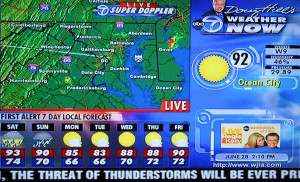Ban weathermen, save traditional media
In the aftermath of disruptive innovation, there are generally two groups trying to navigate the ravaged terrain. There are those who approach the rebuilding as a chance to improve and those who insist on rebuilding everything as it once was.
Somewhere there is still a photojournalist insisting that film will make a mainstream comeback. Every city with more than 100,000 people has a record store that preaches the prolific return of vinyl. Sure, there will always be artists and nostalgic hipsters, but as a preferred format, neither of these media will ever reclaim the title from the disruptive innovation they were replaced by.
On the other hand, declaring any form of media to be dead is very passe´. Records, film, newspaper, and home telephones still exist, but the role they play in mainstream culture has changed drastically. The problem with traditional media (newspapers, magazines, radio, television) is that they are primarily run by people who insist that all things Internet, social, and digital are barely more than a fad. These are the survivors of the disruptive storm who are trying to bring the landscape back to its original grandeur. Meanwhile, the kids are learning how to build stable improvised forts from the debris.
Most professionals running traditional media treat social and digital as an irritant, believing that if they complain about it enough, it will go away. While they often claim to embrace the new communication channels, the half-hearted campaigns demonstrate an obvious expectation that the campaign will fail. Traditionalists refuse to acknowledge that the landscape has changed.
There is no more obvious example of this than weather forecasts on the local news. Local news stations dedicate at least a third of the news broadcast to a mature and trustworthy male, pretty female with a low neckline and raised hemline, or zany former comedian/actor who reads summaries of the relevant reports found onAccuweather or Weather Underground while showing pictures taken of rainbows by local viewers (generally the same 15-30 viewers submit photos each evening).
Local television news is one of the only forms of traditional journalism that is arguably superior to any online counterpart. Reporting live on current events from the day in an entertaining and informative way is more engaging than typing in the URL for a poorly designed local news portal and hunting for the video or abbreviated copy. Local sports is also far from obsolete. No website or social media outlet is going to be as effective at aggregating and summarizing local sporting events.
Local television news could be saved by sacrificing the weather and replacing it with 10-12 more minutes of exclusively local content. If they want to show viewer photos, great! But why not viewer photos from local events from the day? If the weather makes the news, then of course it makes sense to cover it, but simply pointing at a map listing the daily expect highs, or worse, the highs that have already occurred for the day is terrible filler and anyone with a smartphone changes the channel – there is always a rerun of The Middle that is far more engaging than the highs from around the state as of four hours ago.
Television weather is the epitome of the stubborn arrogance of traditional media. Why experiment as risk losing a few 60+ viewers? Because there is a genuine commodity that local television news offers. Television news can present information that won’t be thoroughly covered by any blogger or social media outlet, and the constraints of technology prevent even the local paper from scooping a good story. No other media can compare in presenting local news and sports with video highlights, B-roll, graphics and commentary.
Prediction: The first major local news broadcast to drop the standard weather segment will break viewing records. Not because they fired the meteorologist, but because of the more innovative and engaging content that will replace him/her.
Originally published on LinkedIn – May 26, 2015
